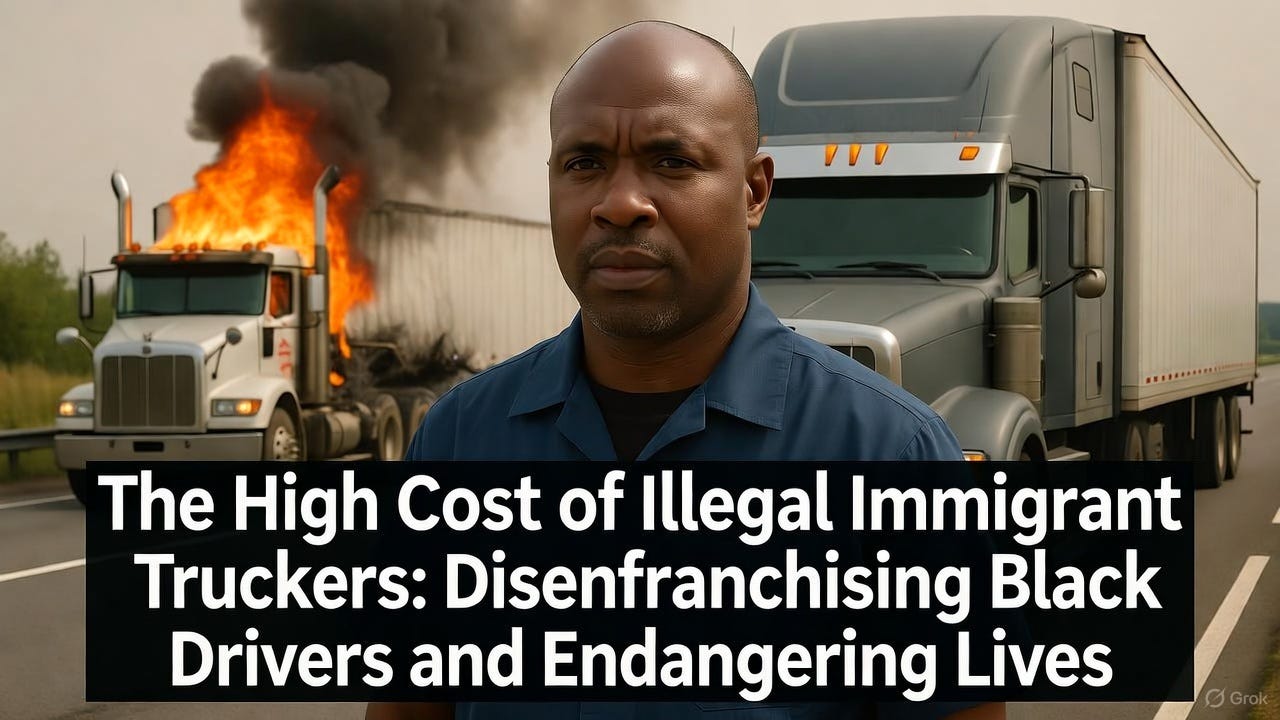Opinion: Illegal Alien Truck Drivers Endanger Americans & Threaten Black Truckers' Livelihoods
Illegal alien truckers undercut wages, flood the market, and, in tragic cases, turn our highways into killing fields.
Driver linked to fatal 8-car crash in Ontario entered US illegally, feds say
Black truckers are telling me the competition is stiff and loads are paying less, a stark reality that underscores the economic pressure they face. In states like California, where illegal immigrant truckers dominate the market with lower rates, these seasoned drivers struggle to secure consistent work or earn a decent wage. This firsthand account highlights how the influx of undocumented drivers is not only a safety concern but also a direct threat to the financial stability of Black truckers who have relied on this industry for generations.
Black truck drivers have long been the unsung heroes of our economy. From hauling freight across the dusty backroads of the South to navigating the concrete veins of urban freeways, these men and women—many descendants of those who built this nation’s infrastructure with calloused hands—have powered the supply chain that keeps shelves stocked and families fed. Yet today, their livelihoods are being eroded not by market forces or technological shifts, but by a flood of illegal immigrant truckers who undercut wages, flood the market, and, in tragic cases, turn our highways into killing fields.
The recent fiery crash on California’s Interstate 10, perpetrated by an Indian national driving under the influence, and the deadly U-turn disaster earlier this year in Florida are not isolated mishaps—they are stark symptoms of the broken immigration system that disenfranchises American workers, especially Black drivers, while endangering us all.
Consider the raw numbers: Immigrants now make up nearly 18% of the nation’s truck drivers, a figure that has more than doubled since the turn of the millennium. This surge comes amid a chronic labor shortage, but it’s no accident. Trucking companies, desperate for cheap labor, have turned to foreign-born workers who often accept substandard pay and grueling hours that deter native-born Americans.
For Black drivers, who comprise about 25% of the trucking workforce—a proportion that holds steady despite broader demographic shifts—this means fiercer competition for jobs that were once a reliable path to the middle class.
Wages stagnate as employers prioritize low-cost hires, and training programs that once uplifted communities of color are sidelined in favor of quick certifications for newcomers. It’s a quiet disenfranchisement: Black veterans of the road, who endured decades of discrimination to earn their commercial licenses, now watch as illegal aliens—many without fluent English or full grasp of safety protocols—snatch routes and rigs out from under them.
The human cost of this policy failure exploded into view just days ago on the 10 Freeway near Ontario, California. On October 21, 21-year-old Jashanpreet Singh, an illegal immigrant from India who crossed the border in 2022 and was released under lax enforcement, barreled his semi-truck into a chain of eight vehicles without braking.
High on drugs, Singh ignited a fireball that claimed three innocent lives and left four others fighting for survival in hospitals. Dashcam footage captures the horror: his Freightliner plowing through slowed traffic like a missile, engulfing cars in flames and debris. Singh, who somehow secured a commercial driver’s license despite his status, now faces charges of gross vehicular manslaughter while intoxicated.
This wasn’t a fluke; it was foreseeable. States like California, with their sanctuary policies and failure to enforce federal English proficiency rules for CDLs, have handed the keys to unqualified foreigners, turning America’s interstates into roulette wheels.
If the Ontario tragedy was a inferno of recklessness, the August crash on Florida’s Turnpike was a grotesque exercise in audacity. Harjinder Singh, another Indian national who illegally entered the U.S. in 2018, attempted a prohibited U-turn on the busy highway—right into oncoming traffic.
A minivan smashed into his trailer’s undercarriage, crumpling like tin foil and killing three South Floridians: a 30-year-old man from Florida City, a 37-year-old woman from Pompano Beach, and a 54-year-old Miami resident. Like Jashanpreet, Harjinder had obtained his CDL in California, exploiting loopholes that ignored his undocumented status and limited English skills. Federal officials decried the state’s “asinine” licensing practices, which enabled this preventable slaughter.
Florida even sued California and Washington for issuing the license, but the damage was done—three families shattered, all because border security was treated as optional. These crashes aren’t just statistics; they’re indictments. In 2025 alone, immigrant truckers have been linked to multiple fatal wrecks, prompting the Transportation Department to withhold $40 million in highway safety funds from non-compliant states.
And who bears the brunt on the roads? Everyday Americans, including Black truckers who risk their lives daily to share space with drivers who may not understand hazard signs or emergency directives. Beyond safety, the economic ripple is devastating: As foreign labor depresses wages—often below market rates to avoid unionization—Black drivers, already facing historical barriers to entry, find it harder to support families or build generational wealth.
It’s time to slam the brakes on this madness. Congress must mandate rigorous vetting for CDL applicants, including real-time immigration checks and mandatory English fluency tests enforced nationwide. States like California should lose funding until they prioritize American workers over sanctuary illusions. And trucking firms must invest in domestic training programs targeted at underrepresented communities, including Black Americans, to reclaim jobs lost to exploitation.



